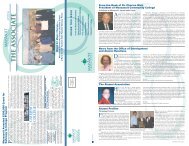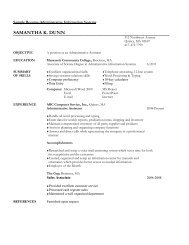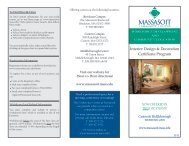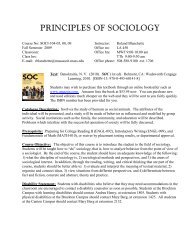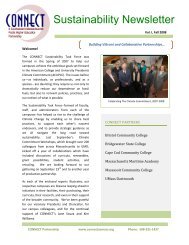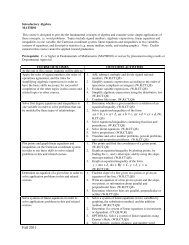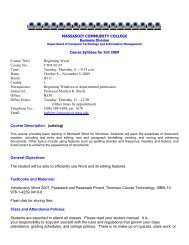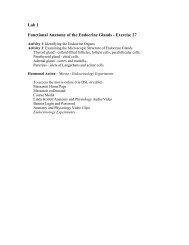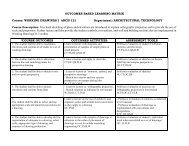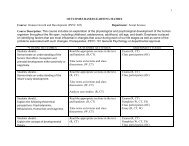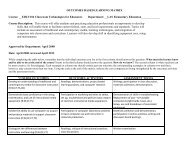Spring 2013 - Massasoit Community College
Spring 2013 - Massasoit Community College
Spring 2013 - Massasoit Community College
- No tags were found...
You also want an ePaper? Increase the reach of your titles
YUMPU automatically turns print PDFs into web optimized ePapers that Google loves.
COMMUNITY EDUCATION COURSE DESCRIPTIONSCSSR218 Latin Dance Part IILatin Dance Part II is a continuation of Latin Dance Social Style.Dances include salsa, rumba, cha cha and samba.TECHNICAL TRAINING-NON CREDITCSTT010 Drinking Water DistributionOffered in partnership with the Massachusetts Water WorksAssociation, this 39-hour state approved Concepts and Practicesof Drinking Water Distribution course is designed to introduce theconcepts of drinking water distribution operations to individualsseeking a new career or presently working in the drinking waterdistribution field. This course is a pre-requisite for taking the drinkingwater licensing exam(s) for water distribution, grades D2, D3, or D4and is a required component for eligibility as an operator-in-trainingor a full license operator. Participants will learn required informationand critical thought processes involved in the understanding of thesuccessful operation and maintenance of drinking water distributionsystems. Additional cost for textbooks.CSTT020 Home Inspector Professional EthicsThis course will provide licensed home inspectors with a 1 hourreview of the standards of professional and ethical conduct as setforth by the MA Board of Registration of Home Inspectors.CSTT023 266 CMR Regulations for Home InspectorsThis course will provide licensed home inspectors with a 4 hourreview of the 266 CMR regulations including the MA Standards ofPractice. Numerous illustrations will be used to teach each systemthat a home inspector is required to know, identify and report on.CSTT027 Plumbing/Gas Systems/Home InspectionThis course is designed to improve the licensed Home Inspector’sunderstanding of basic principles necessary to recognize problemsin plumbing and gas systems in residential properties. You will betrained to make observations and judgments regarding acceptableinstallation and operation of systems, as well as requirements forfixtures, materials, water temperature, pipe sizing, and venting. Basicobservations will be made from CMR 248 Fuel Gas and PlumbingCode as it relates to home inspection. (3.5 contact hours)CSTT028 Heating Systems/Home InspectionThis course is designed to assist licensed home inspectors inunderstanding and recognizing adequately installed and operatingresidential heating systems. Discussion will focus on warm airfurnaces, boilers, and oil distribution systems. An overview ofapplicable MA State Code will be addressed as it relates to the homeinspection process. (3.5 contact hours)CSTT034 Report Writing for Home InspectionThis course will use the 266 CMR as a guide in assisting homeinspectors in the development of their required home inspectionreports (3.5 contact hours).CSTT035 Exterior Aspects of Home InspectionThis course provides a discussion of the elements to look for on theexterior of a home when conducting a home inspection. Learn tomake an informed assessment of outside features provides valuableinsights about the interior, as well as the general condition of thehome (3.5 contact hours).CSTT070 Solar PV Technology Level IThis 50-hour non-credit course provides the theoretical andtechnical knowledge base for a fundamental understanding ofphotovoltaic (PV) solar electric technology. Included are basic PVhistory, terminology, safety, its place in the energy market, as well aselectrical theory, solar energy measurement and design, & systemoutput. The text and NABCEP (North American Board of CertifiedEnergy Practitioners) learning objectives followed in the courseprovide preparation for the NABCEP Entry Level Exam, which isprovided separately following the course - for those interested inthis industry-recognized certificate.CSTT206 Marine Technician Outboard EngineThis course, the second of three required courses for the industryrecognized350-hour Marine Technician Certificate, providesclassroom and hands-on instruction on marine two and four-strokeoutboard engines, including installation, as well as engine systems,preventive maintenance, trouble-shooting and repair. Lessons alsofocus on lower units and propulsion, power tilt/trim, tune-ups, andwinterization. The 350-hour Marine Technician Certificate is issuedjointly by <strong>Massasoit</strong> <strong>Community</strong> <strong>College</strong> and the MassachusettsMarine Trades Association at the successful completion of all threerequired courses in the program.CSTT207 Marine Technician Inboard EnginesThis course, the third of three required courses for the industryrecognized350-hour Marine Technician Certificate, providesclassroom and hands-on instruction in the theory, design, operation,controls, installation and maintenance of marine inboard, inboard/outboard, stern drive and diesel engines. Systems discussed includecooling, lubrication, exhaust, gearing, transmission and hydraulic.The 350-hour Marine Technician Certificate is issued jointly by<strong>Massasoit</strong> <strong>Community</strong> <strong>College</strong> and the Massachusetts MarineTrades Association at the successful completion of all three requiredcourses in the program.CSTT315 15-Hour MCE C & D License Renewal CourseEvery C & D license expires on July 31, <strong>2013</strong>. You must complete a 15-hour MCE course before July 31, <strong>2013</strong> in order to hold a valid licenseafter that date. The State Board of Examiners of Electricians requiresattendees to bring a 2011 National Electrical code. This book canbe purchased through NFPA 1-800-344-3555, www.nfpa.org, orMECA 1-800-231-6322, www.mecanetwork.org. Upon completionof this 15-hour course and the 6-hour professional developmentworkshop, your requirements will be complete.CSTT318 Electrician D License/Alarm SystemsOne of the twelve State-approved and mandated courses requiredto fulfill the NEW 300-hour classroom training requirement for theElectrician D-License, this course covers the history of burglary alarmsystems from their inception to the present. The course discussesthe main components found in burglar alarm systems, how thesecomponents operate, and basic troubleshooting when installingthese components.CSTT319 Electrician D License/Fire SystemsOne of the twelve State-approved and mandated courses requiredto fulfill the NEW 300-hour classroom training requirement for theElectrician D-License, this course covers the history of fire detectionsystems from their inception to the present. The course discussesthe main components found in fire detection systems, how thesecomponents operate, and basic troubleshooting when installingthese components.64



